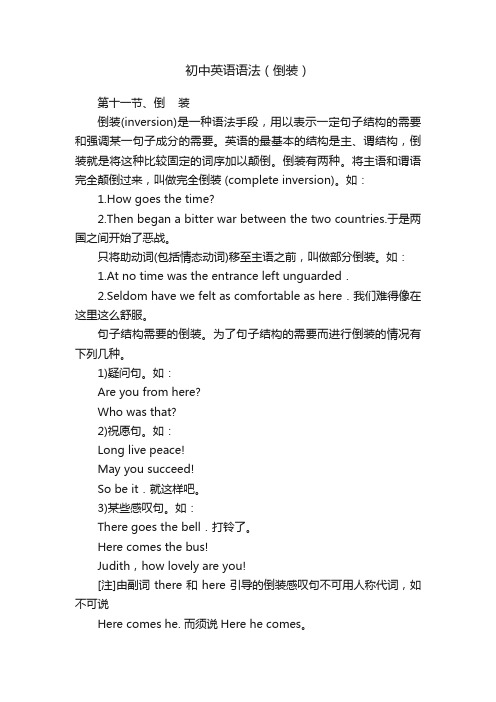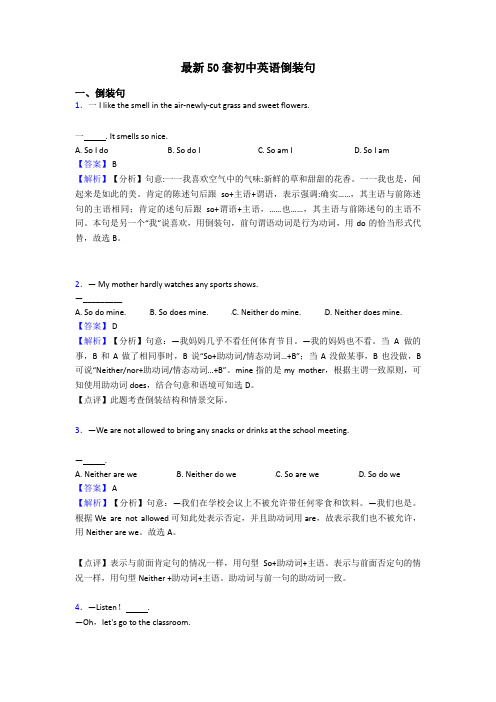初中英语倒装句简单版
完整版初中英语倒装句讲解及练习(1)

完整版初中英语倒装句讲解及练习(1)完整版初中英语倒装句讲解及练习一、倒装句的定义倒装句是指把主语或其它成分放在谓语之前的句子。
二、倒装句的分类1. 全部倒装:把全部谓语动词放在主语的前面。
例如:Never have I seen such a beautiful sunset.2. 部分倒装:把助动词、系动词或情态动词放在主语前,并把它和谓语之间调换位置。
例如:He can speak English, so can his sister.3. 省略倒装:省略掉了连接词的部分倒装。
例如:Here comes the bus.三、倒装句的使用倒装句一般用于以下情况:1. 为了强调句子的某个内容。
例如:In the classroom were the students waiting for the teacher.2. 形式固定的句子。
例如:Not only did he study English, but he also learned French.3. 当句首是副词、介词短语或者表示地点,时间和方式的词组时。
例如:On the wall hangs a picture.4. 在虚拟语气中使用。
例如:Had I known the answer, I would have told you.四、练习1. ________ you ever been to Beijing?A. haveB. HasC. DoD. Did答案:A解析:把 have 放在句首进行倒装。
2. Only in this way ________ the problem.A. can we solveB. we can solveC. solved we canD. do we solve答案:A解析:把助动词 can 与主语 we 调换位置。
3. Hardly ________ when it began to rain.A. I had left homeB. had I left homeC. I left homeD. left I home答案:B解析:把助动词 had 与主语 I 调换位置。
初中英语——倒装句

—_____. He hopes to visit some day.
A.Neither has he
B. Neither does he
C.So has he
D. So does he
倒装句
5.—Would you like to go to the amusement park? —If Jack does, ______.
倒装句 The bus comes here.
倒装句
公交车朝这边来了。
车来了!
将副词here, there, now, then Here comes the bus!
等位于句首,主语放到谓语动词后面去,这样的句子
称为倒装句。常见的谓语动词为be, come, go, lie, run
等。这种倒装的句型结构的主语必须是名词,如果主
倒装句
1、—I don't like documentaries. —________.
A. So do I B. So I do C.Neither do I D. Either do I
2、—I really hate to go to such a noisy place.—_____.
Hale Waihona Puke A.So am I B. So do I C.So have I D. So can I
3、I can't play the piano, and ________.
A. neither can my sister B.my sister can't, too
C. so can't my sister D.can my sister, either
4、 —We have never been to Mexico. What about Jeff?
初中英语语法(倒装)

初中英语语法(倒装)第十一节、倒装倒装(inversion)是一种语法手段,用以表示一定句子结构的需要和强调某一句子成分的需要。
英语的最基本的结构是主、谓结构,倒装就是将这种比较固定的词序加以颠倒。
倒装有两种。
将主语和谓语完全颠倒过来,叫做完全倒装 (complete inversion)。
如:1.How goes the time?2.Then began a bitter war between the two countries.于是两国之间开始了恶战。
只将助动词(包括情态动词)移至主语之前,叫做部分倒装。
如:1.At no time was the entrance left unguarded.2.Seldom have we felt as comfortable as here.我们难得像在这里这么舒服。
句子结构需要的倒装。
为了句子结构的需要而进行倒装的情况有下列几种。
1)疑问句。
如:Are you from here?Who was that?2)祝愿句。
如:Long live peace!May you succeed!So be it.就这样吧。
3)某些感叹句。
如:There goes the bell.打铃了。
Here comes the bus!Judith,how lovely are you![注]由副词there和here引导的倒装感叹句不可用人称代词,如不可说Here comes he. 而须说Here he comes。
4) There+be结构。
如:There lived an old peasant in that house.There seems to be some misunderstanding about the matter.5)其直接引语位于句首的陈述句。
如:“It’s too late,” said Millian.“ This is the house where Shakespeare was born,”said George.6) 地点状语位于句首、主语为名词而谓语为不及物动词的陈述句。
九年级英语常见倒装句最全总结

九年级英语常见倒装句最全总结一、倒装句1・一I USUaIly go hiking Withmyfriends.∙∙ClO I.A. NOrB. SOC. Neither【答案】B【解析】【分析】句意:一一我经常和朋发一起去徒步旅行。
一一我也是。
肯定句后跟"so+ 谓语+主语",表示某人某物也......;否泄句后跟,,Neither∕Nor+谓语+主语",表示某人某物也不•・・・・・O 本题前句是肯定句,故选B。
2・一 I didn't WatCh the football match On TV yesterday.一 _ ・ I got HOme too Iate to WatCh it.A. SO did IB. Neither did IC. SO I didD. Neither I did【答案】B【解析】【分析】neither∕nor+助动词+主语,译为"某人(物)也不......",如果上句是否定句,那么下句就是也不是这种情况:so+助动词+主语,意为"某人(物)也是......"如果上句是肯龙句,那么下句就是也是这种情况。
用于这种结构的主语是不同的人,如果是上下的两句的主语是同一个人,则用半倒装结构,S。
+主语+助动词,表示"某人的确是这样句意:一我没看昨天的聊天节目.一我也没看,我到家太晚而没有看。
结合句意,故选B J3・—Oh, my god ! ReCently I have PUt On 5 POUndS・— __ ・ I think I ShOUld IOSe weight.A. SO do IB. SO have IC. Neither do ID. Neither have I【答案】B【解析】【分析】句意:一啊,我的天呀!最近我长胖了五磅。
一我也是,我认为我应该减减肥了。
so +主语+助动词/情态动词/系动词:某某确实如此,主语与上文是同一人。
最新50套初中英语倒装句

最新50套初中英语倒装句一、倒装句1.一 I like the smell in the air-newly-cut grass and sweet flowers.一 . It smells so nice.A. So I doB. So do IC. So am ID. So I am【答案】 B【解析】【分析】句意:一一我喜欢空气中的气味:新鲜的草和甜甜的花香。
一一我也是,闻起来是如此的美。
肯定的陈述句后跟so+主语+谓语,表示强调:确实……,其主语与前陈述句的主语相同;肯定的述句后跟so+谓语+主语,……也……,其主语与前陈述句的主语不同。
本句是另一个“我”说喜欢,用倒装句,前句谓语动词是行为动词,用do的恰当形式代替,故选B。
2.— My mother hardly watches any sports shows.—_________A. So do mine.B. So does mine.C. Neither do mine.D. Neither does mine.【答案】 D【解析】【分析】句意:—我妈妈几乎不看任何体育节目。
—我的妈妈也不看。
当A做的事,B和A做了相同事时,B说“So+助动词/情态动词…+B”;当A没做某事,B也没做,B 可说“Neither/nor+助动词/情态动词…+B”。
mine指的是my mother,根据主谓一致原则,可知使用助动词does,结合句意和语境可知选D。
【点评】此题考查倒装结构和情景交际。
3.—We are not allowed to bring any snacks or drinks at the school meeting.— .A. Neither are weB. Neither do weC. So are weD. So do we【答案】 A【解析】【分析】句意:—我们在学校会议上不被允许带任何零食和饮料。
—我们也是。
英语倒装句(最全面-最简洁).

3)表语为过去分词 Seated on the ground are a group of young people. 4)表语为进行时态中的现在分词
Lying on the floor was a boy. Standing beside the desk was a teacher.
5. 为了保持句子结构平衡, 或为了强调 表语或状语,或为了使上下文结构紧凑。 They arrived at a farmhouse, in front of which sat a small 要有never, neither, nor, little, seldom(很少,不常), rarely(很少,罕有), hardly, scarcely(几乎不,简直没有), no sooner(立即), by no means(决不) ,not only, in no way(决 不), at no time, few, not, no等, 句式: “否定词/词组+助动词/情态动词/be动词+主语 +其他”。
3.当表示地点的介词词组(如on the wall, under the tree, in front of the house, in the middle of the room等)在句首时。
句式:介词短语+vi+主语(必须是名词)
如:At the foot of the hill lies a beautiful lake. East of the lake lie two towns. Under the tree was lying a wounded soldier.
4. "Not only + 分句,but also + 分句"句 型中的前一分句要部分倒装。
英语倒装句12种类型及例句
英语倒装句12种类型及例句1. 完全倒装:将助动词或be动词放在句首,主语置于助动词或be 动词之后。
- Never have I seen such a beautiful sunset.(我从未见过如此美丽的日落。
)2. 部分倒装:将助动词或be动词放在句首,谓语动词的剩余部分与主语的位置不变。
3.表达否定的副词或短语位于句首时的倒装:4. so/such位于句首时的倒装:- So beautiful was the view that it took our breath away.(如此美丽的景色让我们惊叹不已。
)5.句首状语位于句首时的倒装:- In the corner of the room sat an old man.(房间的一角坐着一个老人)6.条件句中的倒装:- Had I known your true intentions, I would never have trusted you.(要是我知道你的真实意图,我绝不会信任你。
)7.否定词位于句首时的倒装:- Never have I been to Europe.(我从未去过欧洲。
)8.频度副词位于句首时的倒装:- Rarely do we see such dedication.(我们很少见到如此的奉献精神。
)9.祈使句或祈使句部分的倒装:- Stand up!(站起来!)- Be quiet, please.(请安静。
)10. only位于句首时的倒装:- Only by working hard can you achieve your goals.(只有通过努力工作,你才能实现目标。
)11.地点状语置于句首时的倒装:- In the garden were beautiful flowers.(花园里有美丽的花朵。
)12.宾语置于句首时的倒装:- A love like this I have never felt before.(我之前从未感受过如此的爱。
英语倒装句12种类型及例句
英语倒装句12种类型及例句1.完全倒装句:例句: "On the table lies a book."2.部分倒装句(以介词短语、副词或副词短语开头):例句: "In the garden runs a little girl."3.否定副词或副词短语位于句首:例句: "Never have I seen such a beautiful sunset."4. 半倒装句(助动词、情态动词或be动词位于主语之前):5.倒装的祈使句(动词原形+主语):例句: "Go clean your room."6. only位于句首:例句: "Only in her dreams did she see herself as a successful writer."7. so位于句首:例句: "So beautiful was the view that it took my breath away."8. neither/nor位于句首:例句: "Neither did she attend the concert, nor did I."9.如果状语从句放在句首:10.条件从句位于句首:例句: "Should he fail the exam, he will have to retake the course."11.介词短语或副词短语位于句首:例句: "In the corner sat a small dog."12. or/ nor引导的短语或句子位于句首:。
(完整word版)初中常用的倒装句
常用的倒装句文/杨学军郭晓伟一、全倒装句1、在there be 句型中(be还可换成live,lie等表示状态的动词,要用全倒装。
There are a lot of people in the hall.大厅里有很多人。
Long ,long ago ,there lived a king .很久,很久以前,有一位国王。
2、以there,here, now,then 等引起的句子中,谓语动词常为be,come,go 等,要用全倒装。
Here are some picture-books.这儿是一些连环图画。
Now comes your turn.现在该抡到你了。
如果主语是人称代词这不用倒装:Here they are .他们在这儿。
3、某些表示祝愿的句子用全倒装:Long live China!中国万岁!May your country become stronger.祝贵国更强大。
4、so(such)...that 结构中,so或such位于句首加强语气时,用全倒装:So angry was he that he couldn’t speak.他如此愤怒,以致说不出话来。
5、在in,out,aways,off,up,down 等副词开头的句中,为了使情景更生动,用全倒装:Up went the arrow into the air.嗖地一声,箭射上了天。
注:主语是代词时,则不用倒装:Away they went.他们走了。
6、整个(或部分)直接引语置于名词充当的主语前时,用全倒装:“They must be in the fields now.”thought Mr Li.“他们准是下地了,“李先生想。
注:主语是人称代词时,多不用倒装:“What do you want?”he asked.“你要什么?”他问。
7、为保持句子平衡,或使上下文衔接更紧,可把介词短语、形容词、副词或分词提到句首,引起全倒装:On the ground lay an old sick goat,which had gone into the cave to die.地上躺着一只有病的老山羊,它是到洞里去等死的。
2024年中考英语冲刺复习知识点倒装句
倒装句是英语语法中的一种句子结构,常见于以下几种情况:
1.以副词或介词开头的倒装句:
- Never have I seen such a beautiful sunset.
- Under no circumstances should you go there.
2.以否定词开头的倒装句:
- Not only does she speak fluent English, but she also speaks French.
3.在条件状语从句中的倒装句:
- Should you need any assistance, feel free to ask.
4.一些表示地点和方向的介词短语前置时的倒装句:
- Upstairs sat a man, staring out of the window.
5. 在以“so+形容词/副词”开头表示程度的倒装句:
- So tall was he that he had to bend his head to go through the door.
6.表示部分否定的否定副词或短语后置时的倒装句:
- He knows nothing of the matter, nor do I.
7. 在以“only+状语”开头的倒装句:
- Only in this way can we solve the problem.
8. 在以“here/there”引导的倒装句:
以上是2024年中考英语冲刺复习的常见倒装句知识点。
通过重点掌握这些句型,可以提高自己的语法能力,更好地应对中考英语考试。
- 1、下载文档前请自行甄别文档内容的完整性,平台不提供额外的编辑、内容补充、找答案等附加服务。
- 2、"仅部分预览"的文档,不可在线预览部分如存在完整性等问题,可反馈申请退款(可完整预览的文档不适用该条件!)。
- 3、如文档侵犯您的权益,请联系客服反馈,我们会尽快为您处理(人工客服工作时间:9:00-18:30)。
英语倒装句必须弄清两点:①若有主从句,哪句倒装②部分倒装还是完全倒装1. 主语和谓语是句子的核心,它们之间有两种语序。
主语+谓语=> 自然语序谓语+ 主语=> 倒装语序2.倒装语序中又有完全倒装和部分倒装。
3.完全倒装:又称“全部倒装”,将句子中的谓语全部置于主语之前。
此结构通常只用于一般现在时和一般过去时4.部分倒装:将谓语的一部分如助动词或情态动词倒装至主语之前,而而谓语动词无变化。
如句子的谓语没有助动词或情态动词,则需添加助动词do/ does/ did,置于主语之前。
5.倒装条件种类倒装条件例句完全倒装here, there, up, down, in, out,off, away等副词开头的句子表示强调Here comes a circus.*Here you are.There are 2 birds flying in the sky.表示地点的介词短语作状语位于句首Under the tree stood two tables andfour chairs.强调表语,置于句首,或为保持句子平衡Present at the meeting were 1,000students.部分倒装never, hardly, scarcely,seldom, little, not until, not等表示否定意义的副词放于句首Hardly did I know what hadhappened.only和修饰的状语放于句首Only then did he realized theimportance of English.not only... but also连接并列的句子,前倒后不倒Not only does he know French, butalso he is expert at all.neither...nor...连接并列的句子,前后都倒装Neither do I know it, nor do I careabout it.so...that, such...that中的so或such及修饰的成分放于句首时前倒后不倒So busy is he that he can’t go on aholiday.as引导的让步状语Try hard as he will, he never seemsable to do the work well.so, neither或nor表示前句内容也适用于另外的人或事He can play the piano, so can I.用于表示祝愿的祈使句中May you be in good health.省略if的虚拟条件Were I you, I would not do it inthis way.倒装种类:一、表示方位和时间的副词位于句首,句子全部倒装注意:主语是代词时,不倒装例子: 1. The bus comes here. => Here comes the bus.2. The bell goes there. => There goes the bell.3. The students went away. = > Away went the students.4. The chance comes now. = > Now ________ the _________.5. He rushed out. => Out _______ _________.6. He comes here. => There _________ __________.二、以介词短语表示的状语,提前位于句首,全部倒装。
例子1. A tower stands in front of our school.=> In front of our school stands a tower.2. A temple stands at the top of the mountain.=> _______ the top of mountain stands _______ ________.3. Christmas trees, flowers and toys are among the goods.=> _______ the goods ________ Christmas trees, flowers and toys.三、表语位于句首,倒装结构表语+ 系动词+ 主语A.形容词+ 系动词+ 主语Professor White and many other guests were present at the meeting. => Present at the meeting were Professor White and many other guests.B. 过去分词+ 系动词+ 主语The days when they could do are gone.=> Gone are the days when they could do. 四、将so/ neither/ nor放在开头,表示“…也(不)…”,部分倒装注意:表示“确实是这样”不倒装1. He went to the film last night. So did I.2. You must finish your work, so _______ I.3. She is interested in the story, so _______ I.4. He didn’tturn up. Neither ______ his brother.*5. His mother told him not to go to the film. So he did.五、在if条件句,通常可以省略if,而将从句倒装条件:在if 条件句,必须含有系动词were,助动词had 情态动词should1.If he were younger, he would learn skating.Were he younger, he would learn skating.2.If they should forget to bring a map with them, they would get lost in the woods._______ they forget to bring a map with them, they would get lost in woods.3.If they had realize how important the task was, they wouldn’thave refused to accept. => _______ they _________ how important the task was, they wouldn’thave refused to accept.4.If I were you, I would help her.=> _______ I you, I would help her.六、否定词或半否定词位于句首,部分倒装never/ little/ seldom/ not/ nowhere/ scarcely/ few/by no means(决不) / at no time(从不)1.I have never been there. => Never have I been there.2.I knew little about it. => Little did I know about it.3.She seldom came late to school => ________ did she _________ late to school.4.You should buy that kind of car by no means.________ ________ ________ should you ________ that kind of car.七、以not until/ no sooner… than(一…就) /hardly… when(刚…就)/所引导的状语放在句首,部分倒装1.She didn’t realize that she had lost her necklace until she got home.She realized that she had lost her necklace when she got home.=> Not until she got home did she realize that she had lost her necklace.直到她到了家才发现她丢了项链。
2. She didn’t arrive until the film had begun.She arrived when the film had begun.=> Not until the film had begun did she arrive. 直到电影开始她才到。
3. I didn’t know how difficult it was until I began to work.I knew how difficult it was when I began to work.=> Not until I began to work did I know how difficult it was.直到我开始工作,才知道工作的困难。
5.The bell hardly had rung when the class began.________ had the bell rung when the class began.*not only… but also 连接两个成分时,不倒装;连接句子,前面句子倒装。
He not only can speak Chinese but also English. Not only does he speak English well, but also he speaks French well.Not only is he busy, but also I have a lot of work to do.八、only/ often及其修饰的状语位于句首,后面的句子部分倒装1. We can only solve the problem in this way. => Only in this way can we solve the problem.2. He was only able to go home when the war was over.=> Only when the war was over _______ he able to go home.3. I often advised him to give up. => Often did I _________ him to give up.4. You can only hope to make improvement in the operating system in this way.=> Only in this way _______ you ________ to make improvement in the operating system.5. You can only make progress in your English in this way.=> ________ in this way ________ you __________ progress in your English.6. We can only rise in the world(飞黄腾达) through education.=> ________ ________ _________ can we rise in the world.九、so/ such….that 以so/ such开头句子,主句部分倒装1. He spoke so loudly that even people in the next room could hear him=> So loudly did he speak that even people in the next room could hear him.2.The words were so small that he could hardly see them.So small ________ the words that _______ ________ hardly see them.3.It was such an interesting film that we were all deeply moved._______ an interesting film _______ ________ that we were deeply moved.十、as引导的让步状语从句要用倒装语序倒装结构名词/ adj. / adv. / 动词+ as(though) + 主语+ be/ 情态动词1.Though he is a child, he knows a lot about the world.Child as he is, he knows a lot about the world.2.Though he is young, he knows more than you.Young as he is, he knows more than you.3.Though he will try hard, he never seems able to do the work well.Try ______ as _______ _______, he never seems able to do the work well.倒装练习1. Look, ________.A. here the bus comesB. here is the bus coningC. here comes the busD. here the bus is coming2. —Where is Kate? —Look,_______, she is at the school gate.A. there she isB. there is sheC. here you areD. here it is4.Which of the following sentences is correct?A. In the teacher cameB. In did come the teacherC. In did the teacher comeD. In came the teacher4. Out _____, with a stick in his hand.A. did he rushB. rushed heC. he rushedD. he did rush 5. _______, he is honest.A. As he is poorB. Poor is heC. Poor as he isD. Poor as is he5.________, he knows a lot of things.A. A child as he isB. Child as he isC. A child as is heD. Child as is he6._____, you can’tlift yourself up.A. Even you’re strongB. Strong as you areC. How strong you areD. In spite(尽管) you’re strong8. So carelessly ________that he almost killed himself.A. he drivesB. he droveC. does he driveD. did he drive9. Early in the day ____the news _____the enemy were gone.A. come; thatB. came; thatC. comes; thatD. came; what10. Only when you realize the importance of foreign languages_____ them well.A. you can learnB. can you learnC. you learnedD. did you learn11. Not only ____ to stay at home, but he was also forbidden to see his friends.A. he was forcingB. he was forcedC. was he forcingD. was he forced13. Not until his father was out of prison____ to school.A. can John goB. John can goC. could John goD. John could go14. Never before _____ seen such a stupid man.A. am IB. was IC. have ID. shall I15. Rarely ____such a silly thing.A. have I heard ofB. I have heard ofC. am I heard ofD. had I heard of16. Little _____ about his own health though he was very ill.A. he caredB. did he careC. does he careD. he cares17. Only when _____ in the afternoon _____ able to leave.A. the match was over; they wereB. was the match over; were theyC. was the match over; they wereD. the match was over; were they18. Hardly ____ down ____ he stepped in.A. had I sat; thanB. I had sat; whenC. had I sat; thenD. had I sat; when19. No sooner _____asleep than she heard a knock at the door.A. she had fallenB. had she fallenC. she had fellD. had she fell20. She did not see Smith. ________.A. Neither did IB. Nor didn’tIC. Neither I didD. So didn’tI21. In front of the farmhouse ______.A. lay a peasant(农村) boyB. laid a peasant boyC. a peasant layD. did a peasant boy lie22. —You ought to have given them some advice. —_____, but who cared what I said ?A. So ought youB. So I oughtC. So did youD. So I did23. —It was hot yesterday. —_____.A. It was so.B. So was it.C. So it was.D. So it did25. —You like football very much. —________.A. So do IB. So I doC. I do tooD. It is the same with me26. Only by practicing a few hours every day___ be able to master the language.A. you canB. can youC. you willD. will you27. —Where is your brother? —There ______.A. he is comingB. he comesC. comes heD. does he come29. _____ earlier you would have met him.A. If you cameB. If you did comeC. Did you comeD. Had you come。
